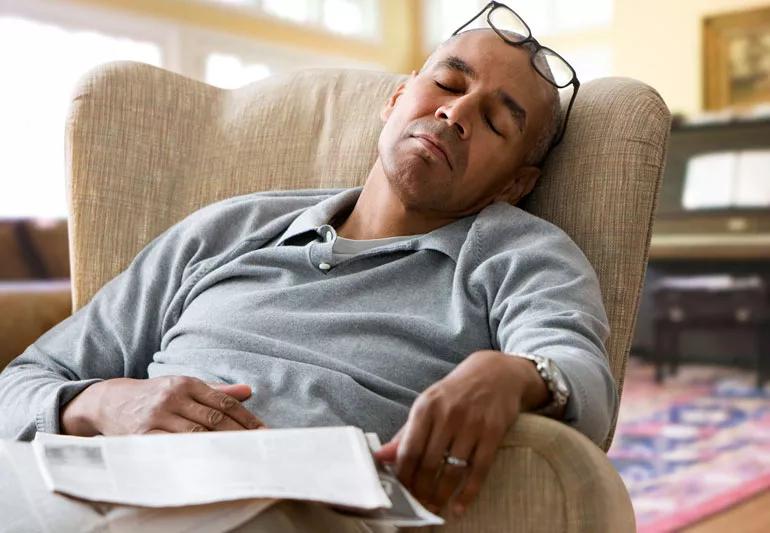And how long should it take you to fall asleep?

Most of us would love to get to dreamland as soon as our head hits the pillow. It’s much more fun than lying awake, watching the hours tick by on the clock.
Advertisement
Cleveland Clinic is a non-profit academic medical center. Advertising on our site helps support our mission. We do not endorse non-Cleveland Clinic products or services. Policy
Still, if you conk out too quickly, it might not be a good thing. Behavioral sleep medicine psychologist Michelle Drerup, PsyD, explains why some of us fall asleep too quickly and when this could signal a sleep problem.
If you fall asleep quickly, there’s good news and bad news. The good news is you might be one of the lucky ones who can drift off with ease. The bad news is you might need more sleep, and that’s why you can’t keep your eyes open. The key is to figure out which group you’re in.
Quality sleep is much more complex than the minutes it takes you to drift off. “Most people need about five to 20 minutes to fall asleep,” says Dr. Drerup. “But this is just an average. Everyone is different.”
If you fall outside of that range, don’t be alarmed. “If it takes you three minutes to fall asleep, but you feel refreshed, you’re probably well-rested,” Dr. Drerup says. “Falling asleep quickly might be normal for you. Don’t put too much emphasis on that number.”
“Sleep deprivation” and “sleep deficiency” are similar but not quite the same. Sleep deprivation means you’re not getting enough sleep. It’s one type of sleep deficiency. But you may also have sleep deficiency if you:
Advertisement
If you’re getting fewer than six hours of sleep a night, you’re probably sleep-deprived. Sleep deficiency is a bit harder to spot.
Even if you fall within the typical range for drifting off, that doesn’t mean you’re getting the sleep you need. If you notice any of these signs, you might be sleep deficient:
Your body needs sleep, just like it needs food and water. People who have chronic sleep deficiency have a higher risk of:
Use these tips to improve your sleep habits and start catching more zzz’s.
Don’t put off sleep for the sake of your to-do list. “Many people think they should skimp on sleep because they’re too busy,” Dr. Drerup says. “But when you’re tired, you’re not as productive. It takes you longer to do things, so you end up wasting time.”
Advertisement
Dr. Drerup says to look at sleep as an investment. “If you get quality sleep, you can focus better and stay on task. You’ll get more things done in less time.”
Getting quality sleep is one of the best things you can do for your health, along with eating a healthy diet and exercising.
If you have signs of sleep deficiency, talk with your doctor. Your doctor can recommend possible tests and treatments to check for sleep disorders or other health conditions. “You can’t afford to skip quality sleep,” Dr. Drerup says. “It makes such a big difference in your daily life and overall health.”
Advertisement
Learn more about our editorial process.
Advertisement

Limited research suggests a weighted blanket may help with anxiety, insomnia and other conditions

If you’re putting off going to bed to have some time for yourself, you’re not doing your well-being any favors
Try setting a regular sleep schedule, creating a comfortable sleep environment and reducing stress

Most adults need seven to nine hours, while young children need around 10 to 14

Using nasal strips and propping your head up in bed are just two ways that may help you stop snoring

Preschoolers who wake up early or have trouble falling asleep may not need their afternoon nap

New research may shed some light on the debated topic

A late-night cocktail can disrupt your sleep cycle in a way that undermines the quality of your rest

If you’re feeling short of breath, sleep can be tough — propping yourself up or sleeping on your side may help

If you fear the unknown or find yourself needing reassurance often, you may identify with this attachment style

If you’re looking to boost your gut health, it’s better to get fiber from whole foods